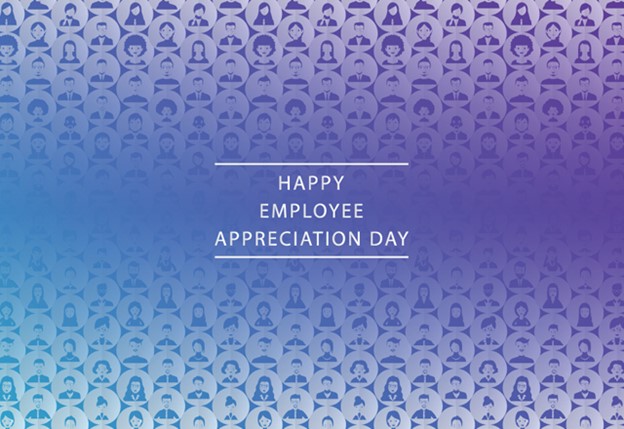The first Friday in March is Employee Appreciation Day. This year, it's celebrated on March 3, 2023.
It was created to focus the attention of employers — in all industries — on employee recognition.
A recent McKinsey report found that 54% of employees leave their jobs because they do not feel valued by their company.
Employee Appreciation Day is an opportunity to let your employees know that their work is meaningful, and your company values them.
Ideas to Celebrate Employee Appreciation Day
- Thank employees with a handwritten note or eCard
This is most meaningful when executive leadership sends a message to the entire organization. As well as managers to each employee on their team – highlighting employee achievements and milestones. - Provide lunch to in-office and remote employees
Show your appreciation by hosting a team lunch for all employees, whether they’re in office, remote, or hybrid. - Give a personal and meaningful gift
Show gratitude and make your employees feel valued with a meaningful gift. - Enjoy a team-building event
As we embrace hybrid work, team building activities help keep your employees connected, wherever they’re located.
ICYMI: Last Minute Employee Appreciation Day Email Template
Why Is Employee Appreciation Day So Important?
Last year, more than 4 million American employees left their jobs during The Great Resignation. Discussions around this have focused on employee dissatisfaction with wages. However, compensation ranks 16th among topics of predicting employee turnover.
Why are employees leaving?
Corporate culture is a much more reliable predictor of attrition than employee compensation.
The top five predicators of attrition during the Great Resignation
- Toxic corporate culture
MIT Sloan Management Review’s analysis found that the leading elements contributing to toxic work cultures include failure to promote diversity, equity, and inclusion; workers feeling disrespected; and unethical behavior - Job insecurity and reorganization
When a company is struggling, employees are more likely to resign in search of more job security and opportunities. - High levels of innovation
Innovation typically requires employees to put in longer hours, work at a faster pace, and endure more stress than they would in a slower-moving company.
Innovative work may be exciting and satisfying, but it’s also harder to sustain long-term. - Failure to recognize employee performance
Companies that fail to recognize and reward strong performers have higher rates of attrition, and the same is true for employers that tolerate underperformance. High-performing employees are the most likely to resent a lack of recognition for their results. - Poor respond to COVID-19
Employees who mentioned COVID-19 more frequently in their reviews or talked about their company’s response to the pandemic in negative terms were more likely to quit.
Actions to Boost Retention, Now
- Provide opportunities for lateral job moves
Employees wants a change of pace or the opportunity to try something new. - Sponsor corporate social events
Social events, like happy hours, team-building, and other activities outside of the workplace promote a healthy culture and team connections. - Offer remote work options
Work remote is slightly more powerful than compensation to predict lower attrition. - Make schedules more predictable for front-line employees
A blue-collar employee is less likely to quit when their schedules are predictable. Having a predictable schedule is six times more powerful in predicting front-line employee retention than having a flexible schedule.
A toxic corporate culture is the single best predictor of high attrition in the first six months.
Failure to recognize high performers, through formal and informal recognition, is likely to drive out your organization’s most productive employees.
The Great Recognition
Matt Fieldman, Executive Director of America Works, recently coined the phrase ‘the Great Recognition.’
Fieldman notes that pivoting from ‘The Great Resignation’ – a negative term that implies that the problem lies with lazy workers – to ‘The Great Recognition,’ which captures how both employers and employees are learning and evolving.
It’s time to turn the Great Resignation into the Great Recognition.
C.A. Short Company Employee Recognition Programs
Employee Appreciation Day is an opportunity to kick off your 2023 recognition strategy broadly. But it can’t stop there.
Successful organizations recognize employees personally and broadly. This includes recognition at the personal level, department level, special occasion, and career milestones.
Your recognition program should be tied to your organization’s values and goals.
High performers will not respond to a program that only includes recognition where everyone wins.
Are you connecting individual success to your company’s future success? If not, C.A. Short Company can help.
Editor's Note: This blog was originally published in 2015 and has been recently updated.



.png?width=70&name=Untitled%20design%20(11).png)






SHARE